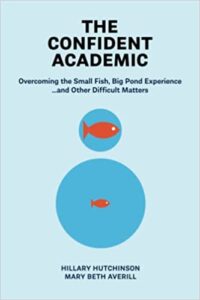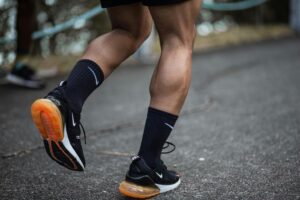Is the Small Fish, Big Pond experience zapping your confidence?

It’s important as an actor to learn, despite the success I had as a kid, that it’s important to understand what it means to be a small fish in a big pond. ~ Anthony Michael Hall, American actor
Confidence is a state of mind. Confidence is a learned behavior, which means you can cultivate both how to appear confident and to be confident. If you are struggling with a lack of confidence, we’ve got a new book to help you, The confident academic: Overcoming the small fish, big pond experience…and other difficult matters. The book will be on sale only for the month of June at Amazon for a reduced price: the paperback edition for $5.99 (reduced from $19.95) and the electronic version for $4.99 (reduced from $14.95). We’re hoping that the reduced cost will encourage our readers to buy the book and post a review.
Confidence is not some form of play-acting or fake it till you make it approach. Real confidence is built on actual solid achievements, from tackling challenging projects and succeeding. Or failing and learning how to do it differently and succeeding the next time.
What is the Big-Fish—Little-Pond Effect (BFLPE)?
Even the highest achievers often struggle with having faith in their own abilities and the work they have produced. Many very bright competent people also struggle with what is sometimes referred to as the Big-Fish—Little-Pond Effect (BFLPE). The literature on this topic dates to a 1984 frame of reference article by Herbert W. Walsh and John W. Marsh, “Determinants of student self-confidence: Is it better to be a relatively small fish in a big pond even if you do not learn to swim as well?” Their answer was that academic self-confidence acquired young does keep you confidently pursuing an academic track.
The model is still being used to measure confidence and has held up well even in the face of moderating influences like classroom practices, friends, social integration, age, economic status, and culture.
The fear: You are not capable, smart, or successful
BFLPE is the simple idea that in a small human group, perhaps as a student in elementary school, it was easy for you to be the big fish as the smartest kid in the class. Growing older meant moving into ever bigger groups, or ponds, and realizing you were not always the smartest or most capable person in the group. For a very bright person moving into ever bigger ponds, say going from elementary to middle to high school and then onto undergraduate and graduate training, it feels as if you are getting smaller and smaller in terms of intelligence and ability.
The truth: You are already successful
Nothing could be further from the truth. The truth is that you are simply becoming ever more surrounded by people equally as smart, capable, and successful as you. Unfortunately, this experience of being with people similar in capability can undermine your confidence.
Our new book: The Confident Academic
The confident academic: Overcoming the small fish, big pond experience…and other difficult matters is designed to help you if you are struggling with confidence. As you can see, we have chosen to focus on the second half of the equivalence, the stage when you are most likely to feel insecure about your abilities, like a small fish in a big pond. This requires learning how to swim in the big pond while not being eaten by the sharks of self-doubt.
No matter the stage in your career, whether you are working in or out of academia, you may find yourself suffering a crisis of confidence. Our book starts with the first necessary steps to build real confidence without arrogance, then moves to goal setting, self-care, high-stress situations, writing, and working confidently with others. The book includes 20 exercises to help in build your confidence no matter the situation you face. A sampling of the exercise titles and purposes is below:
-
Writing Down Your Story
Learning to tell your story from a positive point of view.
-
Naming Your Inner Critic
Figuring out what to do with the inner critic to get it out of your way.
-
Finding Your Ally
Figuring out what can help defend you from attacks of the inner critic.
-
Assessing Your Confidence
Creating an inventory of where you are now in terms of feeling confident.
-
Creating an Achievement Log
Looking at all you have accomplished already in your life successfully.
-
Visualizing Your Future Self
Truly imagining who you can be moving into the future.
-
Creating a Mission/Vision Statement for Your Life
Getting the big picture of who you want to be in the world.
Using this book, you can stop feeling like a small fish in a big pond, overcome imposter syndrome, cope with your inner critic, and handle a wide variety of high-stakes conversations involved in advancing your academic or non-academic career.
For some more tips on building confidence for yourself, see some of my previous blogs including Energy follows attention: Building confidence and 5 ways to build confidence in yourself. If you feel you need help increasing your confidence with some one-on-one attention, contact Hillary for a FREE twenty-minute session.
Tags: academia, academic, change, confidence







Pingback: 5 steps to find focus using one word - Transitioning Your Life